Dignity in the built environment at BLOXHUB, Copenhagen
17 March 2023
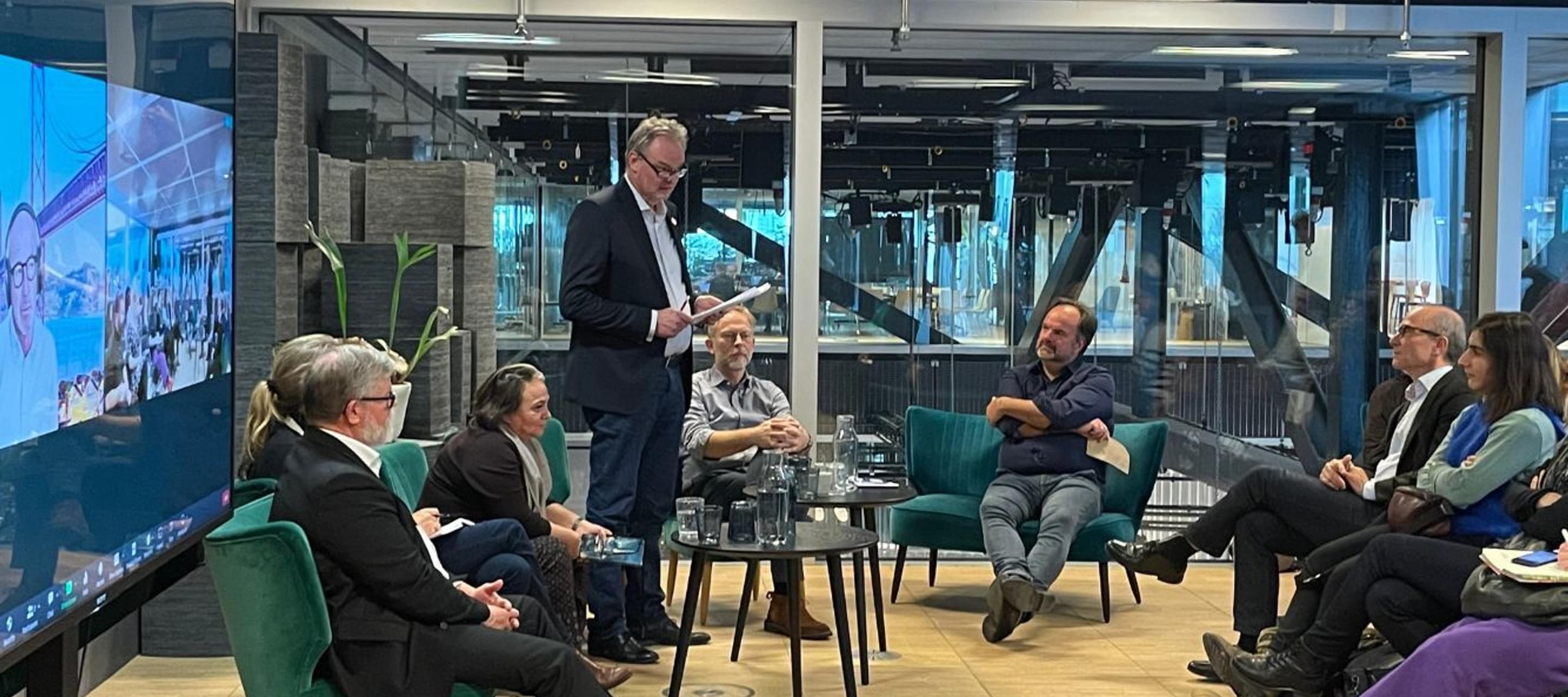
There are bold ambitions underway in Europe to address climate change in the built environment. The focus is on reducing the impacts of materials, shifting to renewable energy sources, increasing energy efficiency, and strengthening resilience. The implications of the Ukraine-Russia conflict, marking one year, and the aftermath of the COVID-19 Pandemic have highlighted the importance of these efforts in the region. All of these processes can be done in a way that continues to deepen inequality and undermines human rights or in a way that pursues a pathway that advances a just transition by expanding social opportunities.
This summary highlights key points from a recent expert discussion, “Dignity in the Built Environment”, organised by IHRB Nordic, BLOXHUB and Raoul Wallenberg Institute on 28th November 2022. The event at BLOXHUB in Copenhagen brought together representatives of workers and tenants unions, industry, finance, environment and human rights experts, local municipalities and civil society.
Reflecting on the need for urban areas to adapt and create resilience towards the impacts of climate change, a just transition to a decarbonised built environment was the canvas for a rich discussion.
At the heart of this topic are the questions, who do we not see? Who is left behind? The most vulnerable and marginalised in society are always the hardest hit.’
Morten Kjærum, RWI
RWI
In Europe, buildings account for 40% of energy consumption and 36% of carbon dioxide emissions, mainly from construction, usage, renovation and demolition. Construction materials dominate resource consumption, and a predicted 50% increase in the demand for transition minerals (e.g. copper and aluminium) and non-metallic minerals (e.g. sand and gravel) over the coming decades not only presents severe environmental impacts but bring front and centre the question of human dignity in a decarbonising built environment.
Thus, the built environmental sector is an area for immediate action, investment and policies to mitigate and adapt to climate change and prevent the deepening of existing inequalities. Measures must include improving building energy performance through circular materials, retrofitting and renovation; decreasing building materials’ carbon footprint through green and circular construction processes; switching to renewable energy supply and strengthening resilience, all taking into account that millions of people still lack access to adequate housing, live in energy poverty and don’t have access to good infrastructure and universal basic services, which in turn aggravates physical and mental health problems, discrimination and inequality.
Social inequality and climate breakdown are at the intersection of a broken economic system. We need a regenerative and inclusive approach to the built environment that prioritises decarbonisation and wellbeing for all.
Alice Haugh
Laudes Foundation
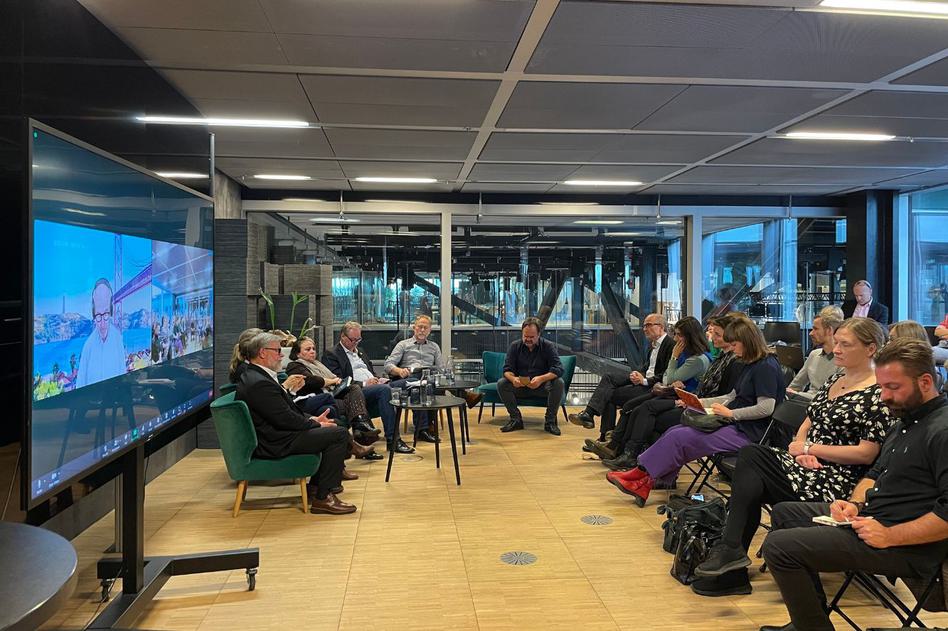
The European Green Deal offers an unprecedented opportunity for progressing a transformative agenda in the built environment as, for the first time, sustainability sits at the centre of all urban policies. Initiatives such as the Renovation Wave and the New European Bauhaus offer exciting opportunities to mobilise funds. Still, a small number of cities are disproportionate recipients of much of this funding. The net needs to be cast wider.
Structural inequalities, such as tenant vs home-owned, represent a severe risk of derailing progress towards a just transition unless the issue of social inequality is addressed much more honestly and transparently. For example, tenants’ rent in Copenhagen has risen at twice the inflation rate in recent years. Homeowner values have soared – 25% of homes are owner-occupied in Copenhagen vs 48% in Denmark. The inequalities between homeowners and tenants are rising, where homeowners are encouraged to undertake energy renovations, but energy-efficient housing commands higher rents, offsetting any energy savings for tenants. Expecting people already burdened by the cost of the living crisis to bear the cost of retrofitting and renovating their homes for carbon reduction is unrealistic.
Investors are naïve to suggest that the market can fix systemic inequalities.
Curt Liliegreen
Centre for Housing Economics
The financialisation of the housing market in Europe (Europe’s mortgage market = €7.83 trillion) is driving deep inequality and homelessness. Unlocking finance in the built environment, which prioritises net zero, regenerative and circular business models, is critical to tackling these systemic blockages. Pension funds investing in property also have a potentially vital role in counteracting the financialisation of housing and becoming part of the solution, not exacerbating the problem. The financialisation of housing means that stronger regulation is needed to ensure genuine sustainability and social equity. Governments need to build this into tendering processes and procurement requirements much more strongly, and increased transparency is required to counteract the rise in greenwashing.
In the New European Bauhaus, Ursula von der Leyen did not talk about workers or tenants - this narrative needs to be strengthened and flipped from one of deprivation to one of resilience, inclusive, sustainable communities and decent job growth.
Ivone Martins
EEA
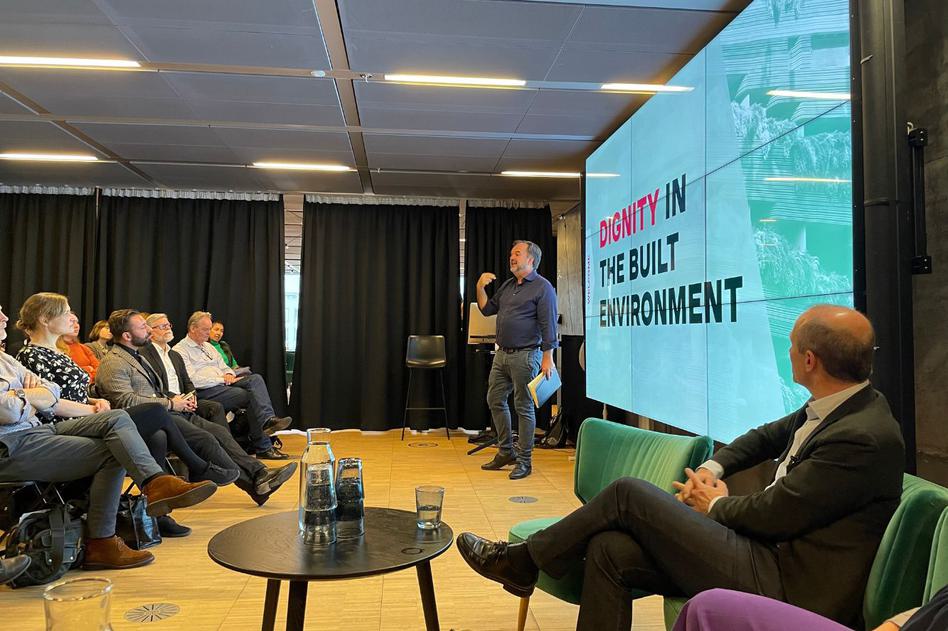
By 2030 the European Commission estimates 160,000 new ‘green’ jobs in the EU, but there is no guarantee that these will be ‘decent’ jobs, e.g. unionised, living wage, etc. Construction workers on-site and through supply chains – often migrants – face poor and unsafe working conditions and live in inadequate housing, experiencing an erosion of their rights. The spotlight on migrant worker working conditions and deaths in the construction of the Qatar 2022 stadium has highlighted the human cost of poorly enforced labour regulations in the construction sector. Similarly, the human rights dimensions of climate change are now being addressed more explicitly. Just transition within urban transformation must be rooted in human rights.
Without metrics and quality control, the just transition risks going the same way as Corporate Social Responsibility – meaning everything to everyone and therefore nothing to anyone. It also risks the anti-transition voices turning the just transition debate toxic.
John Morrison
IHRB
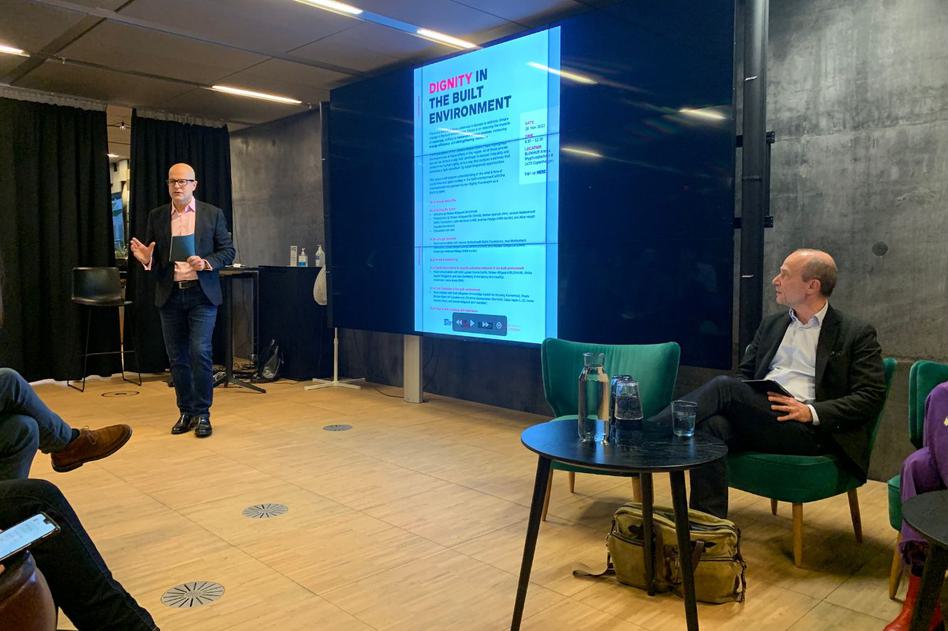
A systems analysis is required to identify incentives and disincentives for more effective regulation of the construction sector and respect for human rights at other stages of the built environment lifecycle.
Stronger evidence, robust data and more human stories are needed to strengthen the movement and bring inclusivity and human dignity into the mainstream of a sustainable built environment. It is crucial to present evidence-based new economic models built on circularity and social capital, e.g. collaborative housing models, and solid data to underpin arguments about the need for a just transition being the means to counteract social inequalities and to avoid at all costs the risk of a ‘green apartheid’, e.g. those who can afford to decarbonise their homes, use EVs, live in green areas of cities etc. and those who cannot.
Measuring the social value created is complex but essential to unlock significant investment.
As the anti-climate transition movement is gathering pace and voice, e.g. Dutch cattle farmers and the gilets jaunes in France, it is crucial to secure buy-in through meaningful participation and stakeholder engagement with communities around issues such as the inevitability of people increasingly needing to live in smaller homes, shared housing etc., and raise awareness of what just transition means in the context of urban development, what are the opportunities but also, what are the risks concerning social equity.
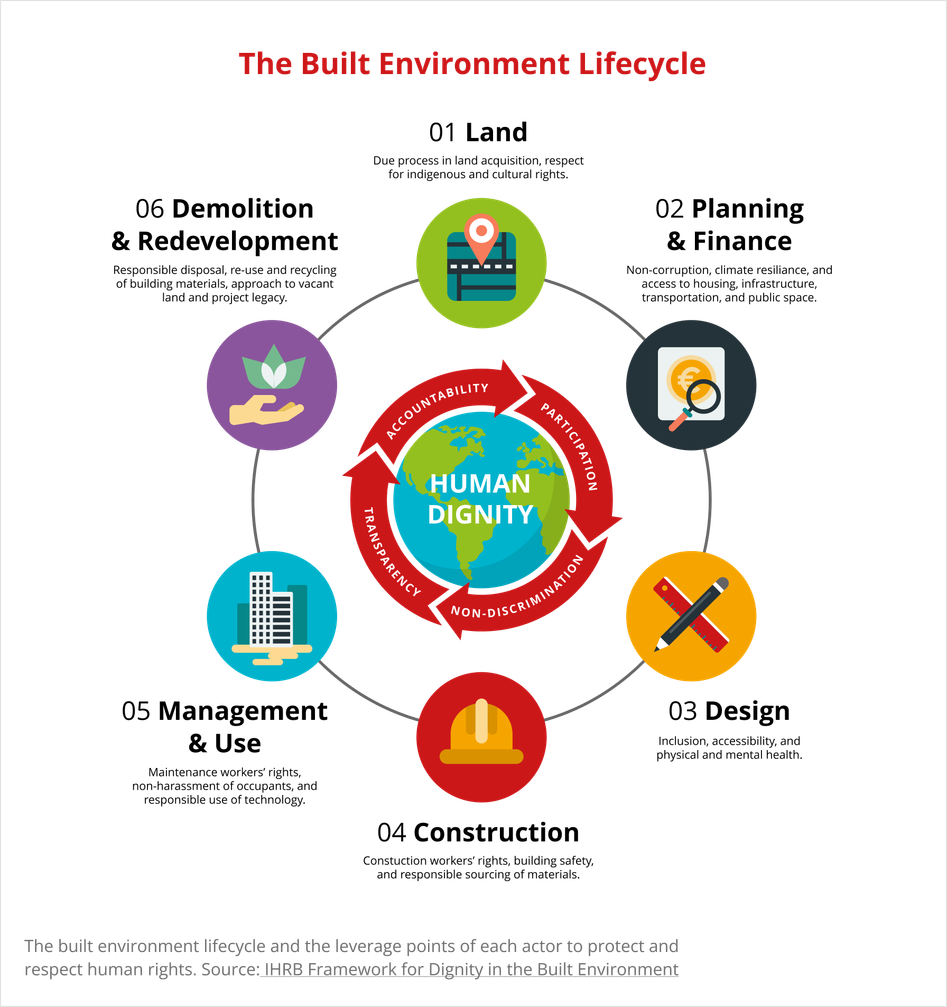
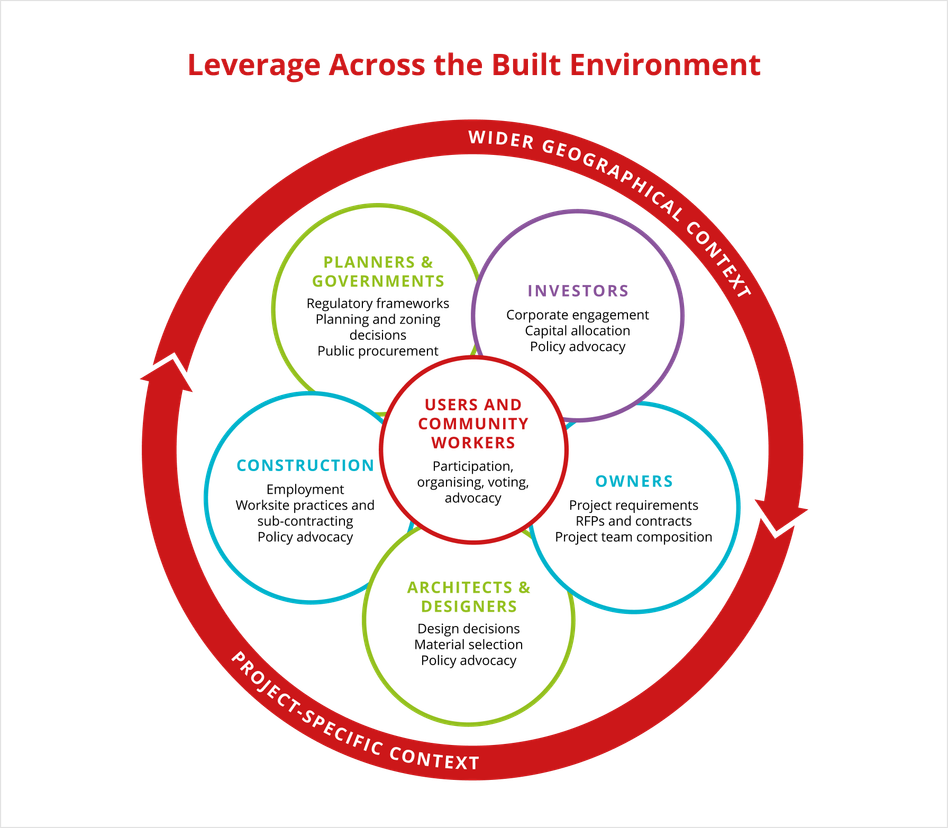
The Dignity by Design Framework brings a human rights lens to the What? Where? How? of what gets built and a valuable tool for building a shared understanding in this regard. It is a globally applicable and locally adaptable framework for all actors around the lifecycle of a building project, from land acquisition, finance and planning to end use and beyond.
Through coalition building, shared narrative and networks like Bloxhub and other centres of gravity, we have the means to contribute to driving this agenda forward in Europe.
Learn more:
The event
Agenda and speakers included:
Setting the Scene
- Welcome and introduction by Torben Klitgaard (Director, BLOXHUB), Morten Kjærum (Director, RWI), John Morrison (CEO, IHRB)
- Presentations by Andreia Fidalgo (Europe Programme Manager, Built Environment, IHRB Nordic), and Alice Haugh (Programme Manager, Built Environment, Laudes Foundation)
- Discussion with Q&A
Let’s get concrete:
Moderator: Andreia Fidalgo (IHRB Nordic)
- Moderated conversation with Frances House (Senior Advisor, IHRB), Asal Mohtashami (Architect, AIM-byliv), Danila Lampis (Architect, Danila Lampis arkitekt), and Michael Ulfstjerne (CEO, EAHR)
Break & Networking
Nordic innovations in equality and social inclusion in the built environment
Moderator: Anna Bruce (Senior researcher, RWI)
- Presentation followed by moderated conversation with Emil Lassen (Co-founder, Home.Earth); Torben Klitgaard (Director, BLOXHUB); Ulrika Signal (Project manager, Tengbom) and Moa Sundberg (Urban designer, Helsingborg Municipality)
Just Transition in the built environment
Moderator: John Morrison (CEO, IHRB)
- Moderated conversation Curt Liliegreen (Director, Knowledge Centre for Housing Economics), Troels Bulow-Olsen (joining virtually, Chairman AP Ejendomme), Christine Rasmunssen (Senior Market Manager for Social Sustainability, Rambøll); Claus Højte (Director, LLO); Ivone Martins (Urban Sustainability Coordinator, EEA); Gunde Odgaard (Head of Secretariat, BAT-Kartellet)
Closing & Networking





